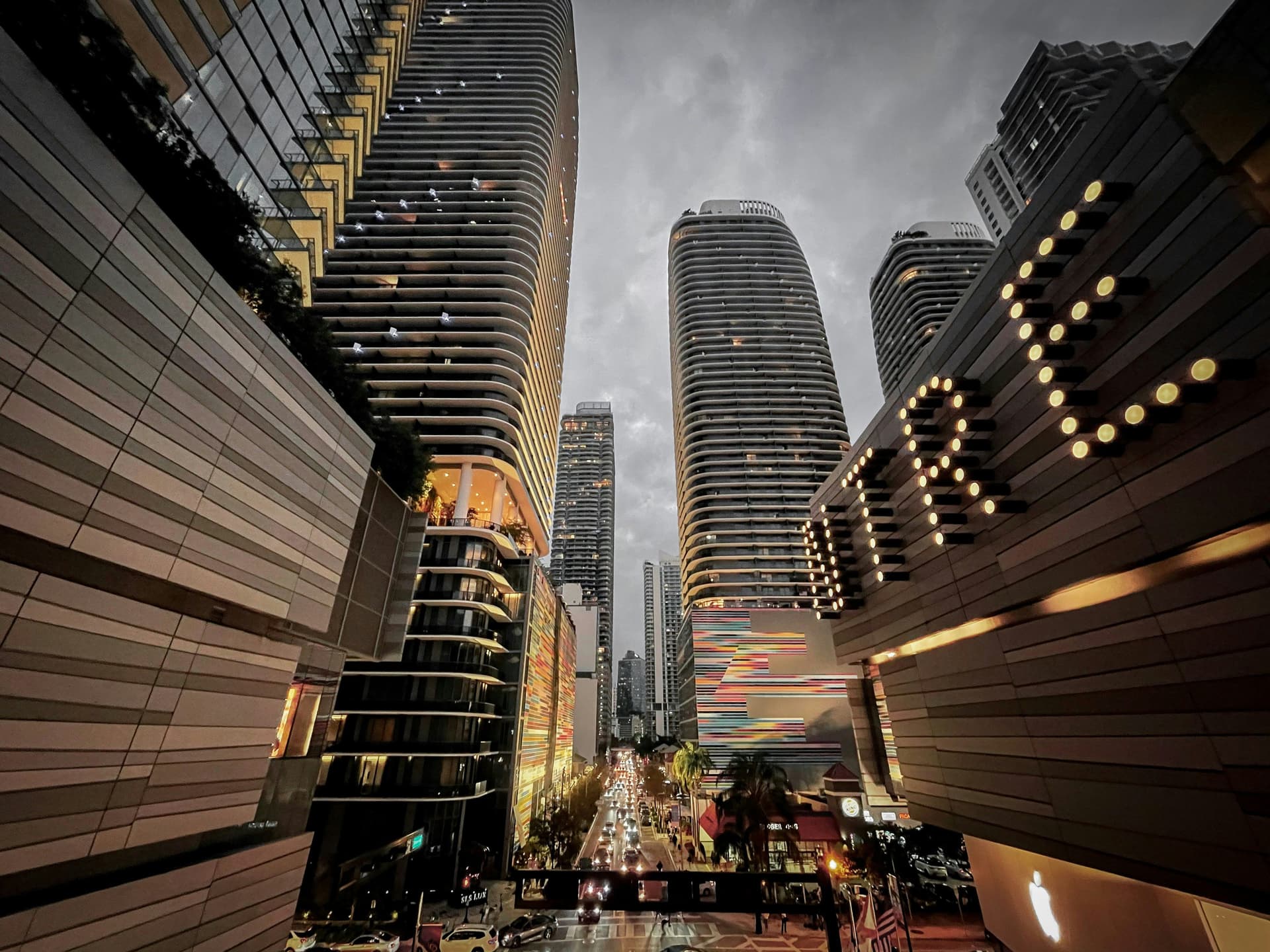Pre-Construction Condos in Miami: Complete Buyer's Guide
Pre-Construction Condos in Miami: Complete Buyer's Guide
You're standing in a sales center looking at architectural renderings of a gleaming tower that exists only as a concrete foundation and a pile of marketing materials. The sales agent is explaining how you can lock in today's prices for a unit that won't be ready for three years, with the possibility of significant appreciation by completion.
Pre construction condos Miami represent both the biggest opportunities and biggest risks in the city's real estate market. Done right, you can secure prime units at below-market prices and benefit from appreciation during construction. Done wrong, you can end up with delays, cost overruns, or properties that don't match the promises.
This guide breaks down everything you need to know about miami new developments, from evaluating developer track records to understanding the complex contracts that govern preconstruction investment purchases. We'll cover the major projects coming online through 2027 and the due diligence process that separates smart investments from expensive mistakes.
For context on Miami's current market conditions, check our complete buying guide. Investors should also review our ROI analysis guide to understand how pre-construction timing affects investment returns.
Miami Pre-Construction Market Overview
Miami's construction boom shows no signs of slowing, with developers racing to meet demand from both local buyers and international investors seeking new, modern properties with the latest amenities.
Current Development Pipeline
Miami-Dade County has approximately 18,500 residential units in various stages of pre-construction development, representing about $12 billion in total project value. This pipeline includes everything from affordable housing to ultra-luxury towers exceeding $2,000 per square foot.
Development breakdown by area:
- Brickell: 6,200 units across 14 major projects
- Downtown Miami: 4,800 units across 11 projects
- Miami Beach: 2,100 units across 8 projects
- Coconut Grove: 1,900 units across 6 projects
- Other areas: 3,500 units across various smaller projects
Timeline distribution:
- 2025 deliveries: 4,200 units
- 2026 deliveries: 6,800 units
- 2027 deliveries: 5,100 units
- 2028+ deliveries: 2,400 units
The heaviest delivery period will be 2026, which could create temporary market softness if absorption doesn't keep pace with new supply.
Major Developers and Their Track Records
Understanding developer performance history is critical for pre-construction success. Here are the major players and their recent performance:
Tier 1 Developers (Excellent track records):
- Related Group: Delivered 95% of projects on time over past decade
- Fortune International: Strong international sales and financing
- Terra Group: Focus on luxury and ultra-luxury segments
- PMg: Consistent delivery and quality construction
Tier 2 Developers (Good track records with some delays):
- Melo Group: Strong local presence, occasional timeline extensions
- Property Markets Group: Good quality, variable timing
- Kolter Group: Mixed-use expertise, generally reliable
New/Unproven Developers:
- Several smaller developers entering Miami market
- International developers with limited US experience
- Joint ventures between established and new players
Always research specific project history, not just developer reputation, as even good developers can have individual project challenges.
Market Demand vs. Supply Projections
Demand drivers:
- Continued population growth in South Florida
- International buyer interest in new construction
- Corporate relocations bringing high-income buyers
- Replacement demand for aging condo inventory
Supply concerns:
- 2026 delivery peak may temporarily exceed absorption
- Construction cost inflation affecting project viability
- Labor shortages causing delays and cost increases
- Rising interest rates impacting buyer qualification
Absorption analysis: Miami typically absorbs 8,000-10,000 new condo units annually during normal market conditions. The 2026 delivery peak of 6,800 units should be manageable, but timing will be critical for individual projects.
Benefits and Risks of Pre-Construction Purchases
Pre-construction buying involves trade-offs between potential rewards and real risks that don't exist with completed properties.
Advantages: Price Appreciation and Customization
Price appreciation potential: Pre-construction buyers often benefit from price increases that occur during the 2-3 year construction period. Miami pre-construction prices typically increase 15-30% from initial sales to completion, though this varies by market conditions.
Recent appreciation examples:
- Brickell City Centre: 28% increase from pre-construction to completion
- Paramount Miami Worldcenter: 22% increase over construction period
- Aria on the Bay: 19% increase from initial sales to delivery
Customization opportunities:
- Interior finish selections and upgrades
- Unit combination possibilities (combining adjacent units)
- Floor plan modifications during early construction phases
- Technology and smart home system integration
Financial advantages:
- Extended payment schedules spreading costs over 2-3 years
- No mortgage payments until completion
- Potential for assignment sales (flipping contracts)
- Protection against price increases in rising markets
Risks: Construction delays and Market Changes
Construction delay risks: Average Miami condo project experiences 3-6 month delays beyond original completion dates. Factors causing delays include:
- Permit approval complications
- Weather delays during hurricane season
- Labor shortages and material supply issues
- Design changes and construction complications
Market change risks: Real estate markets can shift significantly during 2-3 year construction periods:
- Interest rate increases affecting buyer qualification
- Economic downturns reducing demand
- Oversupply conditions depressing prices
- Changes in buyer preferences or neighborhood desirability
Developer risks:
- Financial difficulties forcing project delays or cancellations
- Quality issues or construction defects
- Changes in project scope or amenities
- Bankruptcy or ownership changes
Contract and legal risks:
- Complex contracts favoring developers
- Limited buyer protection clauses
- Difficulty obtaining financing at completion
- Assignment restrictions limiting resale options
Developer Reputation Assessment
Key evaluation criteria:
Financial stability:
- Review developer's balance sheet and credit ratings
- Assess project financing sources and construction loan status
- Check for previous bankruptcy or financial difficulties
- Verify adequate capital reserves for project completion
Delivery history:
- On-time completion percentage for recent projects
- Quality of construction and customer satisfaction
- Handling of warranty issues and post-completion problems
- Reputation among real estate professionals
Project-specific factors:
- Site control and permit status
- Construction loan approval and funding
- Pre-sales achievement relative to lender requirements
- Project team experience and track record
Research multiple sources including local real estate professionals, previous buyers, and public records to verify developer claims.
Major Pre-Construction Projects in Miami (2025-2027)
Here are the most significant miami condo developments 2025 through 2027, organized by neighborhood.
Brickell Developments
The Residences at 1428 Brickell
- Developer: Melo Group
- Units: 189 residences
- Price range: $650,000 - $2.2M
- Completion: Late 2025
- Status: 65% pre-sold
Features include rooftop amenities with bay views, ground-floor retail, and proximity to Brickell City Centre shopping and dining.
Una Residences
- Developer: OKO Group and Cain International
- Units: 135 ultra-luxury residences
- Price range: $2M - $15M+
- Completion: Mid-2026
- Status: 45% pre-sold
Ultra-luxury tower with unique curved architecture, private elevators, and exclusive amenities including private wine storage and yacht services.
Cielo Residences
- Developer: Mast Capital and 13th Floor Investments
- Units: 320 residences
- Price range: $580,000 - $1.8M
- Completion: Early 2027
- Status: Pre-sales launching
Mixed-use development with retail component and affordable entry-level pricing for Brickell location.
Miami Beach New Construction
Aman Miami Beach Residences
- Developer: Vladislav Doronin and Aman
- Units: 50 ultra-luxury residences
- Price range: $15M - $50M+
- Completion: Late 2025
- Status: 70% pre-sold
Ultra-exclusive development with Aman hotel services, private beach access, and limited number of oversized units.
The Residences at Miami Beach EDITION
- Developer: Ian Schrager Company and EDITION Hotels
- Units: 26 luxury residences
- Price range: $8M - $25M
- Completion: Mid-2026
- Status: 40% pre-sold
Boutique luxury development with hotel services, oceanfront location, and architectural significance.
Downtown Miami Mixed-Use Projects
Legacy Hotel & Residences
- Developer: Gencom and Turnberry Associates
- Units: 390 residences
- Price range: $450,000 - $1.5M
- Completion: Early 2026
- Status: 55% pre-sold
Mixed-use project combining hotel and residential components with downtown entertainment district location.
Miami Worldcenter Residences (Phase 2)
- Developer: Miami Worldcenter Associates
- Units: 429 residences
- Price range: $400,000 - $2M
- Completion: Late 2026
- Status: Pre-sales launching
Continuation of successful Phase 1, with improved amenities package and lessons learned from initial development.
Coconut Grove Waterfront Developments
The Ritz-Carlton Residences, Miami Beach
- Developer: Lionheart Capital and The Ritz-Carlton
- Units: 111 luxury residences
- Price range: $2M - $8M
- Completion: Mid-2027
- Status: Pre-sales launching
Waterfront location with marina access, hotel services, and family-friendly Grove neighborhood appeal.
Grove at Grand Bay (Phase 2)
- Developer: Terra Group
- Units: 98 luxury residences
- Price range: $1.5M - $6M
- Completion: Late 2027
- Status: Planning phase
Continuation of successful Grove at Grand Bay development with updated amenities and design improvements.
Pre-Construction Purchase Process
Buying pre-construction requires understanding a multi-stage process that differs significantly from purchasing completed properties.
Reservation and Contract Process
Initial reservation:
- Refundable deposit ($5,000-$25,000) to reserve specific unit
- 10-15 day review period for contract and building documents
- Option to cancel and receive full deposit refund during review period
Contract execution:
- Legal review period (recommended 5-10 business days)
- Additional deposit due at contract signing (typically 10% of purchase price)
- Binding agreement with specific performance requirements
Contract key terms:
- Completion date and delay penalty clauses
- Buyer's right to cancel for construction delays
- Developer's right to make design changes
- Assignment rights and restrictions
Payment Schedule and Milestones
Typical payment schedule:
- Contract signing: 10% of purchase price
- Foundation completion: 10% of purchase price
- 50% construction completion: 10% of purchase price
- Completion/closing: Remaining 70% plus closing costs
Payment timing considerations:
- No mortgage payments during construction period
- Opportunity cost of deposits earning minimal interest
- Need for readily available funds at each milestone
- Potential for payment schedule modifications due to delays
International buyer considerations:
- Currency exchange timing for each payment
- Wire transfer requirements and fees
- Tax implications of staged payments
- Banking relationships for US dollar payments
Contract Terms and Protection Clauses
Buyer protection clauses:
- Right to cancel for construction delays exceeding specified timeframe
- Deposit refund provisions for developer default
- Warranty coverage for construction defects
- Specifications and finish quality guarantees
Developer protection clauses:
- Right to make design changes that don't materially affect unit
- Force majeure provisions for delays beyond developer control
- Limitation of liability for various project changes
- Requirement for buyer to close regardless of market conditions
Assignment and resale rights:
- Many contracts restrict assignment (flipping) until completion
- Developer approval required for any assignment
- Assignment fees and profit-sharing arrangements
- Impact on warranty and other buyer protections
Due Diligence for Pre-Construction Investments
Pre-construction due diligence goes beyond typical property analysis to include project viability, developer assessment, and market timing considerations.
Developer Financial Stability
Financial documentation to review:
- Developer's financial statements and credit history
- Construction loan approval and funding status
- Project budget and cost controls
- Previous project performance and profitability
Red flags in developer finances:
- Multiple projects under development simultaneously
- Dependence on pre-sales for project funding
- History of project delays or cancellations
- Limited experience with projects of similar scale
Project financing verification:
- Construction loan commitment from reputable lender
- Adequate equity contribution from developer
- Pre-sales requirements and achievement status
- Contingency funds for cost overruns
Permit and Approval Status
Regulatory approvals to verify:
- Building permits and approval status
- Environmental impact assessments
- Zoning compliance and special use permits
- Utility capacity and infrastructure approvals
Approval timeline risks:
- Permit approval delays affecting construction start
- Environmental or archaeological discoveries
- Community opposition or legal challenges
- Changes in zoning or building code requirements
Market Absorption Analysis
Competitive analysis:
- Similar projects under construction in same area
- Pricing comparison with competing developments
- Amenity packages and differentiation factors
- Target buyer demographics and market overlap
Absorption rate projections:
- Historical absorption rates for similar projects
- Current market conditions and buyer demand
- Economic factors affecting buyer qualification
- Seasonal patterns in Miami real estate sales
Risk mitigation strategies:
- Focus on established developers with proven track records
- Choose projects with strong pre-sales performance
- Verify adequate financing and regulatory approvals
- Consider assignment rights for early exit opportunities
Financing Pre-Construction Condos
Pre-construction financing involves unique considerations because you're committing to a loan for a property that doesn't yet exist.
Construction-to-Permanent Loans
How construction-to-permanent loans work:
- Initial approval based on project plans and specifications
- Interest-only payments during construction period
- Conversion to permanent mortgage at completion
- Final approval based on completed property appraisal
Qualification requirements:
- Pre-approval based on current income and assets
- Ability to qualify again at completion (income stability important)
- Down payment requirements typically 20-30%
- Cash reserves for payment schedule during construction
Rate and term considerations:
- Interest rate lock options (usually limited to 6-12 months)
- Rate adjustment provisions for longer construction periods
- Conversion terms to permanent financing
- Prepayment penalties and modification options
International Buyer Considerations
Additional requirements for foreign buyers:
- Higher down payment requirements (30-40%)
- US-based assets or income preferred
- More extensive documentation and verification
- Currency hedging considerations for multi-year commitments
Financing alternatives for international buyers:
- Asset-based lending programs
- Foreign national mortgage programs
- Cash purchases with later refinancing
- Developer financing options (limited availability)
Timeline and Payment Requirements
Pre-construction payment timeline:
- Contract deposit due at signing
- Periodic payments tied to construction milestones
- Final payment and closing at completion
- Coordination with construction schedule changes
Cash flow planning:
- Budget for staged payments over 2-3 year period
- Plan for potential construction delays affecting timing
- Maintain liquid reserves for unexpected costs
- Consider opportunity cost of staged payments versus immediate full purchase
Pre-construction purchases can offer significant opportunities in Miami's growing market, but success requires careful evaluation of developers, realistic timeline expectations, and thorough contract review to protect your investment.
Ready to explore Miami's pre-construction opportunities? Visit Pink Miami to work with specialists who understand new development projects and can help evaluate off plan condos miami that match your investment goals and risk tolerance.



